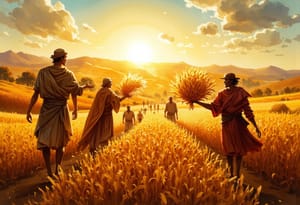| Series | Abundance and want |
|---|---|
| Theme | 2. Scarcity - Fa'aitiitia |
| Colour | Lanu Mūmū |
Scripture Focus: Levitiko 23:15-22
‘‘You shall count from the next day after the Sabbath, from the day that you brought the sheaf of the wave offering; seven Sabbaths shall be completed: even to the next day after the seventh Sabbath you shall number fifty days; and you shall offer a new meal offering to Yahweh. You shall bring out of your habitations two loaves of bread for a wave offering made of two tenth parts of an ephah of fine flour. They shall be baked with yeast, for first fruits to Yahweh. You shall present with the bread seven lambs without defect a year old, one young bull, and two rams. They shall be a burnt offering to Yahweh, with their meal offering, and their drink offerings, even an offering made by fire, of a sweet aroma to Yahweh. You shall offer one male goat for a sin offering, and two male lambs a year old for a sacrifice of peace offerings. The priest shall wave them with the bread of the first fruits for a wave offering before Yahweh, with the two lambs. They shall be holy to Yahweh for the priest. You shall make proclamation on the same day: there shall be a holy convocation to you; you shall do no regular work. This is a statute forever in all your dwellings throughout your generations. ‘‘When you reap the harvest of your land, you shall not wholly reap into the corners of your field, neither shall you gather the gleanings of your harvest: you shall leave them for the poor, and for the foreigner. I am Yahweh your God.’’
- Leviticus 23:15-22 (WEB)
Study:
Leviticus 23 describes the Feast of Weeks, a deeply symbolic celebration that includes ritual offerings and the command to leave part of the harvest for the poor and the foreigner. This instruction highlights God's heart for justice and compassion towards the vulnerable. By not harvesting the edges of the fields or gathering what is dropped, the Israelites practiced generosity embedded in their worship. It reminds us that even in times of scarcity, God calls His people to care for those in need, making justice an integral part of their daily lives and faith.
Application:
Today, this passage challenges believers to consider how we respond to scarcity and abundance. Just as the Israelites were commanded to leave gleanings for the poor, we are called to be mindful of the needs of those around us, especially the marginalized and oppressed. Justice is not only a societal ideal but a spiritual mandate. Practical actions—such as supporting local charities, advocating for fair treatment, or simply sharing what we have—reflect God’s justice and love in the world.
Reflection Questions:
- How do I currently practice generosity and justice toward the poor and marginalized?
- In what ways can my community create opportunities to serve those in need?
- What barriers prevent me from living out the call to leave 'gleanings' for others?
- How does understanding God’s provision during scarcity impact my trust in Him?
Prayer:
Gracious God, teach us to love and serve boldly, especially those in need. Help us to embody Your justice and compassion in every part of life. May our actions reflect Your heart for the poor and marginalized, trusting Your provision in all things. Amen.
Tags: poor, justice, Leviticus, Bible study, generosity, compassion, faith, harvest, gleaning, Christian living, scripture reflection
